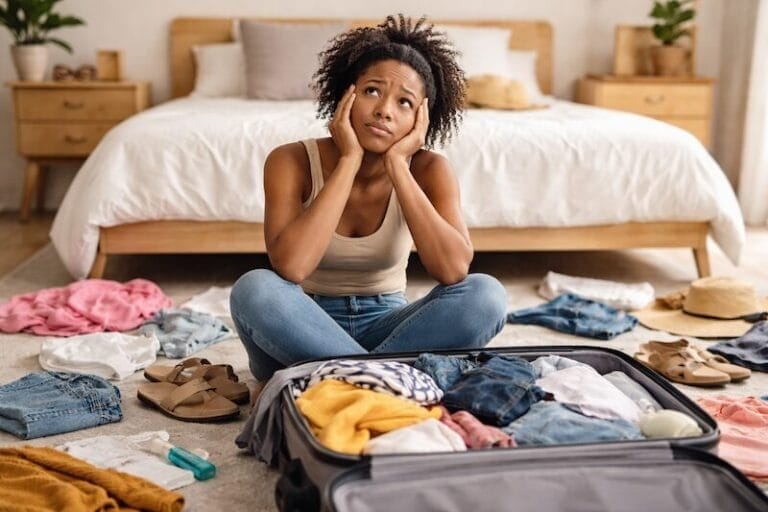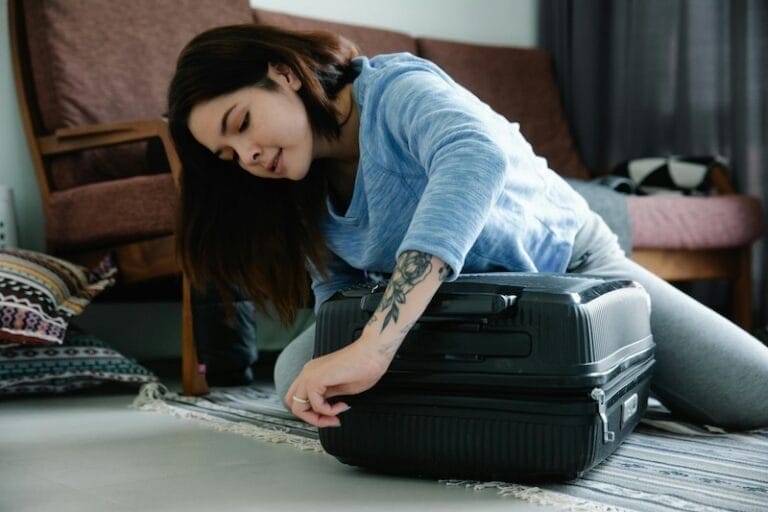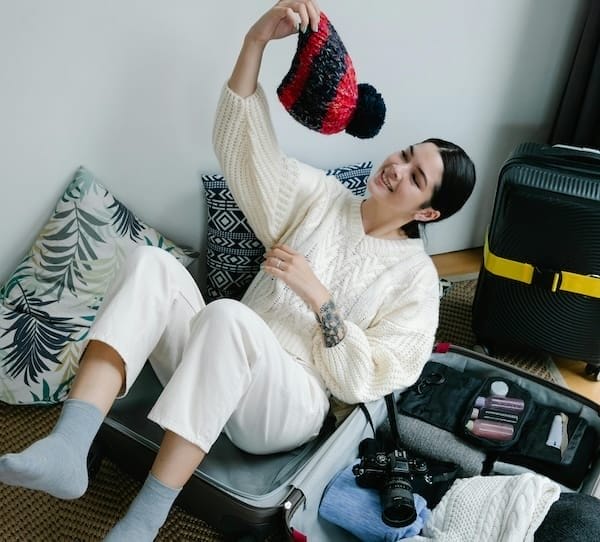Traveling to new places is exciting, but unfortunately, it can also come with the risk of theft and pickpocketing. Nobody wants their trip to be marred by such an unpleasant experience, which is why this step-by-step guide on what to pack to stay safe while traveling is here to help. By providing you with practical tips and advice, this post aims to empower you to protect yourself and your belongings while traveling. We understand the concern and anxiety theft can bring, and we want to make sure you have the knowledge and tools to prevent it from happening to you.
Our Reader’s Picks for the Top Travel Safety Tools



Your Quick List of How to Stay Safe While Traveling
Research your destination
To ensure a safe and worry-free trip, it is essential that you research the safety level of your destination before traveling. Start by looking up information on common scams in that area. By understanding the tactics used by scammers, you can be better prepared to recognize and avoid them. Additionally, find out about high-crime areas so that you can steer clear of them or take extra precautions if necessary.
It is crucial to dig deeper and gather as much specific information as possible. Check government travel advisories or websites dedicated to travel safety for any alerts or warnings about your destination. These resources often provide valuable insights into the current safety situation. Finally, don’t forget to explore any specific precautions you should take. For instance, some destinations might require you to carry identification at all times or be vigilant about pickpocketing.
Secure your belongings
- Carry securely: Keep your valuables, such as your passport, cash, and credit cards, secure at all times. Use a money belt or a hidden pouch to carry them close to your body. This way, they will be less accessible to potential thieves.
- Lock it up: Whenever you’re not using your valuables, consider using a lockable luggage or a small safe in your accommodation. Locking your belongings provides an added layer of protection against theft. Especially in shared accommodations.
- Choose a secure hiding spot: If you decide to leave your valuables in your accommodation, make sure to choose a secure hiding spot. Look for places that are inconspicuous, and avoid leaving them in plain sight, as this can attract unwanted attention.
- Photocopy important documents: Before you set off on your journey, make copies of your passport, credit cards, and other important documents. Keep these copies separate from the originals. In case of loss or theft, having copies will facilitate the process of reporting and replacing the missing items.
Stay aware of your surroundings
To maintain situational awareness and stay safe, it is crucial to pay attention to your surroundings. Here are some essential tips to help you maintain your awareness:
- Be cautious in crowded areas, such as busy streets, shopping malls, or public events. These places can be breeding grounds for pickpockets and other petty criminals. Stay alert and keep an eye on your belongings at all times.
- Pay special attention when using public transport, such as buses, trains, or subways. These places can be crowded and offer opportunities for theft or other types of crime. Stay vigilant and be aware of your surroundings, especially when boarding or disembarking.
- Take extra caution at popular tourist attractions, as they can attract both tourists and criminals. Keep an eye out for suspicious behavior or individuals who seem out of place.
- Avoid becoming engrossed in your phone or other distractions while walking in public areas. Constantly looking at your phone can make you an easy target for theft or accidents. Stay focused and be aware of what’s happening around you.
Use secure bags and pockets
Choose bags and pockets that are difficult for pickpockets to access. Look for bags with hidden compartments, such as secret pockets on the inside or the back, where you can store your valuables. Opt for bags made from slash-resistant materials like reinforced fabrics or even metal mesh, which can prevent thieves from easily cutting through the bag. Another feature to consider is bags with locking zippers, providing an added layer of security that deters pickpockets.
For example, a crossbody bag with a hidden pocket behind the main compartment can be a great choice. You can safely store your passport, credit cards, and cash in the hidden pocket, out of sight and reach. This makes it harder for pickpockets to target these valuable items. Another option is a backpack with slash-resistant material, making it virtually impenetrable and protecting your belongings from thieves armed with sharp objects.
Additionally, consider keeping your wallet or phone in a front pocket or a money belt. By doing so, you keep these important items close to your body where you can easily monitor them. This adds an extra level of protection since pickpockets often focus on easy targets like back pockets or bags that are loosely held. Remember, the goal is to make it as difficult as possible for pickpockets to access your belongings, so be proactive in choosing the right bags and pockets for your travel adventures.

Avoid flashy displays of wealth
1. Dress modestly: When in a new place, opt for clothing that is appropriate for the local culture and generally avoids standing out. Dressing too ostentatiously can make you a target for theft or unwanted attention. Choose neutral colors and avoid wearing expensive or excessive jewelry that could draw unnecessary attention to you.
2. Leave expensive gadgets behind: While it’s tempting to showcase your latest smartphone or expensive gadgets, it’s advisable to leave them safely at home or in your hotel room when you’re exploring unfamiliar areas. Walking around with flashy gadgets can make you a potential target for theft. Instead, carry simpler devices that blend in with the local norms.
3. Limit your cash exposure: Avoid carrying large amounts of cash when you are out and about. Instead, rely on safer alternatives such as credit cards, traveler’s checks, or local currency in moderate amounts. Make sure to keep these valuables concealed in a secure place as well.
4. Be aware of your surroundings: Pay attention to your environment and remain alert to any potential risks. Avoid showcasing wealth or counting money in public. It’s best to blend in and not draw unnecessary attention to yourself.
A Basic Travel Safety Do’s & Don’ts List
- Do: Dress in modest clothing that respects the local customs and norms.
- Don’t: Wear expensive jewelry or flashy designer labels that draw attention.
- Do: Carry a simpler smartphone or electronic device that doesn’t attract unwanted attention.
- Don’t: Display expensive gadgets or flaunt your latest tech possessions.
- Do: Use your credit card or traveler’s checks instead of carrying large amounts of cash.
- Don’t: Flash large wads of money or count money publicly.
- Do: Stay aware of your surroundings and avoid standing out as a wealthy tourist.
Be cautious of strangers
When you find yourself approached by a stranger who is unexpectedly friendly and offers help or assistance without you asking for it, it’s important to exercise caution. Trust your instincts and be skeptical of their intentions. Politely decline any suspicious offers that may put you at risk of theft or harm.
Your Quick List for Meeting New People While Traveling
- Stay alert: Pay attention to your surroundings and be wary of strangers who approach you out of the blue with unsolicited offers or assistance. Trust your gut feeling if something feels off.
- Assess the situation: Take a moment to evaluate the situation. Are there any red flags? Does the stranger seem excessively friendly or overly insistent on providing help? Be cautious of strangers who appear too good to be true.
- Politely decline: If you feel uncomfortable or suspect that the stranger’s offer may be a setup for theft or harm, it is crucial to politely decline. You can simply say, “No, thank you. I’m all set.” Keep your response firm and assertive while maintaining your politeness.
- Maintain distance: After declining their offer, try to create distance between yourself and the stranger. It’s important to prioritize your safety and well-being. Move away from the situation and find a place where you feel more secure.
Backup important documents
To ensure the safety of your important documents while traveling, it is highly recommended that you make copies of them. The best way is to make digital copies and save to a place you can access anywhere, even if you have to use a device other than your own. Like google docs or your email. These documents include your passport, visas, travel insurance, and any other significant paperwork you might need.
Start by taking clear and legible photocopies of each document. Most modern cellphones have a scan documents feature right on the native apps.
Want to learn more about Travel Safety?
Check out this post on how to create a Travel Emergency Action Plans
Final Tips for Staying Safe
By following these tips and strategies, you can significantly minimize the chances of falling victim to theft and pickpocketing during your travels. Remember to thoroughly research your destination, secure your belongings, maintain situational awareness, utilize secure bags and pockets, avoid flaunting your wealth, exercise caution with strangers, and always have backups of important documents. By taking these proactive steps, you can ensure a safer and more enjoyable travel experience.






I have a suggestion for a related topic you could cover in future articles: how to protect your electronic devices from theft while traveling. I always worry about my laptop and smartphone being stolen when I’m on the go.
Thank you for your suggestion! Protecting electronic devices from theft is an important topic that many travelers are concerned about. I will definitely consider covering this in a future article and provide tips on how to keep your devices safe while traveling. Stay tuned!
Thank you for your feedback! Researching the destination is indeed a crucial step to ensure a safe and enjoyable trip. It’s great that you take the time to gather information about the safety of the place you’re traveling to. This can definitely help in making informed decisions and avoiding risky situations.
One tip that I would add is to use a money belt to store your cash and important documents. It’s a discreet way to keep your valuables safe, especially in crowded areas where pickpocketing is common.
That’s a great addition to the list! Using a money belt is an effective way to keep your cash and important documents hidden and secure. It’s a precautionary measure that can give travelers peace of mind, especially in busy tourist areas where pickpocketing is prevalent. Thank you for sharing this tip!
I really like the tips in this guide, especially about researching the destination beforehand. I always make sure to research the safety of the place I’m traveling to and any specific areas to avoid. It helps me plan my itinerary and choose accommodations in safer areas.
I followed these steps during my recent trip and it worked like a charm! I didn’t encounter any theft or pickpocketing incidents. It really pays off to stay aware and take precautions. Thanks for the helpful guide!
I’m thrilled to hear that the guide helped you have a safe and worry-free trip! Your positive feedback is greatly appreciated. It’s always rewarding to know that the tips provided were effective in preventing theft and pickpocketing incidents. Thank you for sharing your experience!
I disagree with the suggestion of avoiding flashy displays of wealth. While it’s important to not attract unnecessary attention, sometimes showing wealth can actually deter potential thieves as they may see you as a difficult target.
Thank you for sharing your perspective! It’s true that some travelers prefer to display their wealth as a deterrent to theft. However, it’s important to consider the risks associated with drawing attention to oneself. The suggestion to avoid flashy displays of wealth aims to minimize the chances of becoming a target for pickpockets. Ultimately, it’s a personal choice and travelers should assess the situation and decide what makes them feel safest.